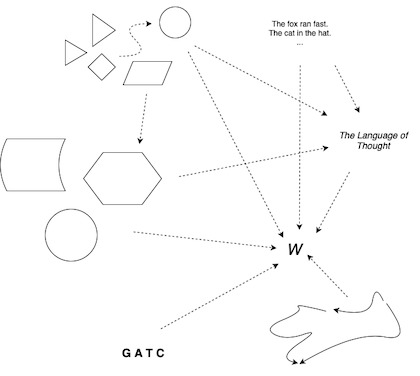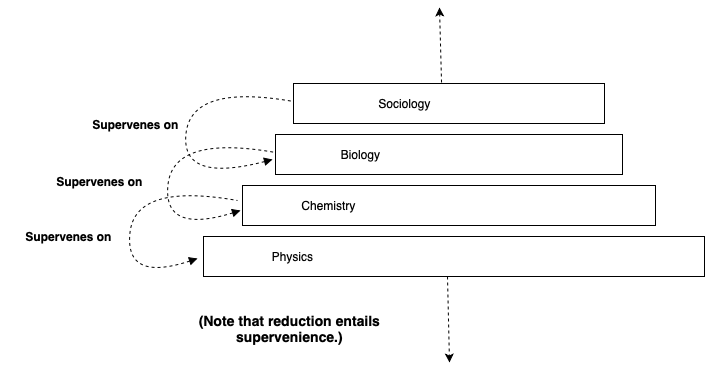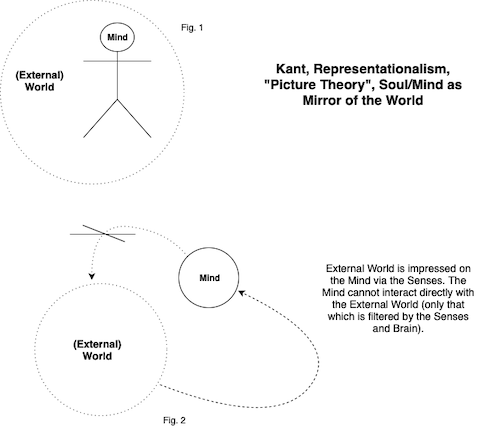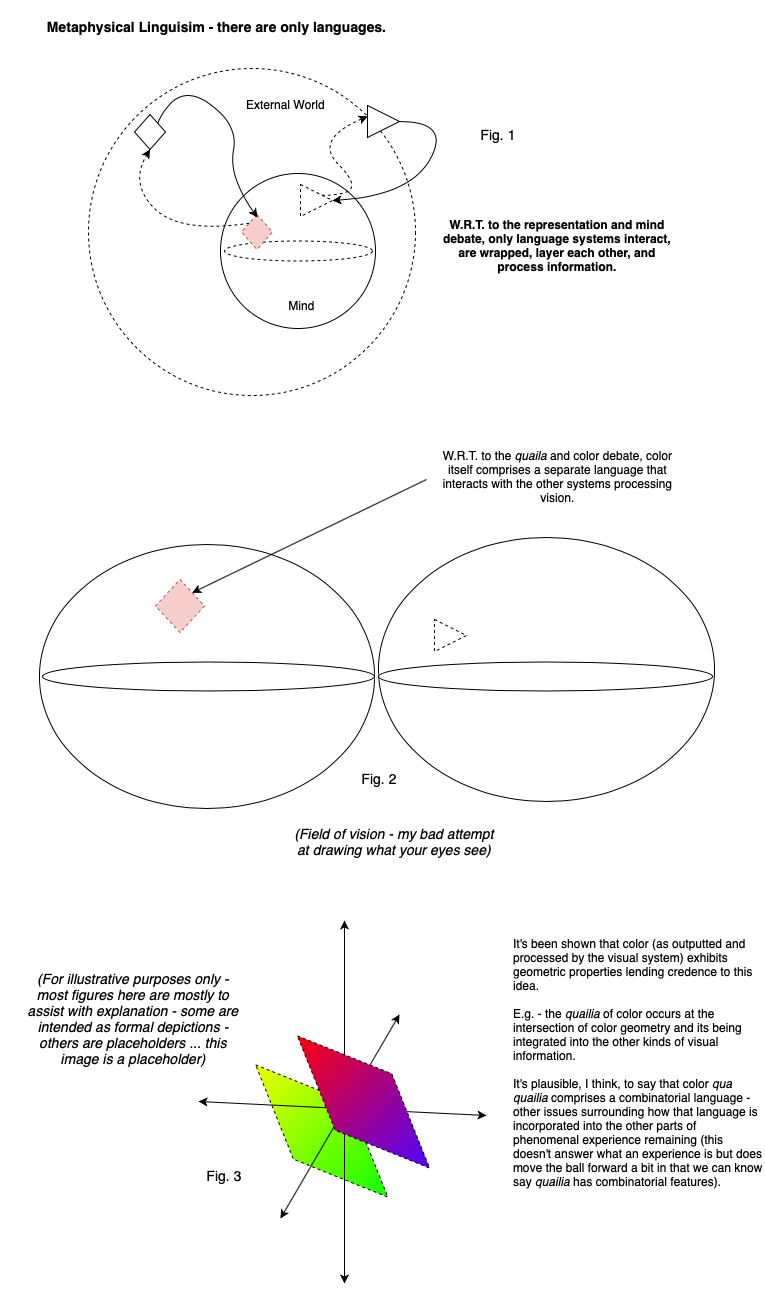Metaphysical Linguism
(Sketching in a novel metaphysical view that has the potential to remove several of the problems confronting some of the most famous theories in the history of philosophy.)
I have alluded to the view below here and elsewhere.
The sketch below is hardly a comprehensive work and likely, hardly a completely original work (it's so difficult to say one's ideas are fully and completely spawned from a void in principle - everything builds off the work of others). Nevertheless, this appears to be highly original and lacks any counter-part I'm aware of.
Humorously: we might think of the view as the metaphysical extreme of the "Linguistic Turn" that's taken to mark the beginning of Analytic Philosophy.
Reality
A few ways of thinking about Reality as it is aimed for in metaphysics (the branch of philosophy interested in the concept):
- Mind-independent - if there were no minds or thinking beings, Reality is what would remain. This may or may not entail some kind of non-mentalistic realism and can be delimited even within a system like Hegel's or Berkeley's. (e.g. - what is mind-independent apart from some Absolute, or some Deity, etc.)
- Ultimate reality - what is most objectively existing.
- A list of all existing entities. That which exists.
- That which is contrasted with the mental or subjective.
Most analytic philosophers have taken the view that Reality (in the senses above) should be replaced as jargon with something less ambiguous.
The most popular candidate is the Existential Quantifier from predicate logic.
Historical Views
A quick, non-exhaustive, and somewhat imprecise summary of core views throughout history:
- Idealism: only mental things exist.
- Platonism: only abstract things exist.
- Materialism: only matter and material things exist.
- Physicalism: only physical things exist (whether they are abstract, concrete, or material) such as Space-Time itself (which may not be abstract, concrete, nor material depending on most accounts).
- Process ontology: only events exist.
Traditionally, each of the theories above have typically been expressed as varieties of reductive monism.
Views Of language
A quick, non-exhaustive, summary of core views about language throughout history:
- Propositions, Logical Forms, and Linguistic Meanings: candidates for how sentences share meanings and why the meaning of a sentence can vary so much from what is literally said or written.
- Logical Atomism: Russell's reduction of factual statements to propositions of the Principia-Mathematica.
- Representationalism
Language Defined
Not to be conceived as merely the following:
- Acoustic utterances
- Written or spoken art forms (music, poetry, literature, etc.)
- Social contrivances (slang, dialogue, conversation, formal etiquette)
- Formal debates
None of those would even pass as a suitable Linguistics 101 definition. From a mathematical logic and syntax vantage point:
- A Language L is defined as:
i. A grammar defining valid wff from a valid lexicon or alphabet
ii. A semantics for defining truth-evaluations and truth-assignments (interpretations) within L
iii. A proof or inference system for L
- L also comprises a generative grammar, a semantically-closed language, a context-free grammar, and logic.
We can strip L down and remove the proof system and semantics so that only a grammar and alphabet remain. This corresponds to the basic compound concepts called morphemes and phonemes in Natural Languages (along with their attendant grammar systems which are far more powerful and flexible than their Artificial Language counterparts).
But even those common definitions (used throughout Linguistics, Philosophy, Mathematics, Logic, Computer Science) don't capture the entirety of:
- All things we intuitively ascribe to language - e.g. pragmatics (social practices that are part of language itself), intentionality (not just human intention - read: desire, intent - but the wider philosophical concept which concerns "aboutness" - how can an arrow be pointed at something and have direction at all - read: we grasp that it is directed but that's not inherent to the arrow ... we have some fundamental ability to understand that which the arrow itself indicates), representation (how things can stand for something else), semiotics (how symbols work - what "symbols" are), etymology (the history and evolution of words), norms (the use of language to enforce rules of a non-linguistic nature), implicature (reasoning to the intended meaning of an utterance), etc.
- It also doesn't include items that we ought to ascribe to language but don't - e.g. non-human languages, bizarre human languages that are singularly unique in lacking core features found in every other of the thousands of human languages discovered, body language (to support written or spoken meaning), conveyed meaning without utterances or written marks at all, etc.
A broader theory of language sees only the following constraints (and these too may be too restrictive):
- A combinatorial system with a rule-system or regulated process defining the proper combinations or possible concatenations of the items in the system.
Here, DNA, English, Set Theory, Java, etc. are all languages ... but languages of different kinds.
Arguments
Motivating arguments:
- Existing formal representations of language are incomplete, non-exhaustive, or contradictory.
- If existing formal representations of language are incomplete, non-exhaustive, or contradictory then, the existing conceptions of language represented by them are incomplete, non-exhaustive, or contradictory.
Therefore, the existing conceptions of language represented by them are incomplete, non-exhaustive, or contradictory.
The first and second premises are partly justified by the considerations above.
- Being part of or a combinatorial system governed by regulated processes or rules is sufficient for being part of or a language.
- DNA is a combinatorial system governed by regulated processes or rules.
- Cellular automata are combinatorial systems governed by regulated processes or rules.
- Quantum systems are combinatorial systems governed by regulated processes or rules (unitary evolution, the wave-function, etc.).
- Mathematical systems are combinatorial systems governed by regulated processes or rules.
- Axiom systems are combinatorial systems governed by regulated processes or rules.
DNA, cellular automata, quantum systems, mathematical systems, axiom systems systems are languages.

If the counter-argument is that Language (capital L) must conform to the conventional definitions utilized in linguistics, formal logic, etc. the rebuttal is straightforward:
The metaphysical linguist replies, "Sure, but you've missed the point - we may call Languages, in the sense that I am using them, whatever - call them forms of life or prime languages! Your argument is merely a ruse of fallacious semantics."
Above, Wittgenstein's "form of life" is read literally - perhaps humorously and surprisingly so.
The upshot: we can call the conception of language espoused by this view whatever we want, W, provided that:
- W's are combinatorial systems with a rule-system or regulated process defining the proper combinations or possible concatenations of the items in the system.
- More specific languages (conforming to perhaps more traditional notions of language as used presently in linguistics, etc.) are species of W's.
- This aligns each W and language therein, into scientific and well-ordered relationships replacing dubious notions like reduction, emergence, and supervenience.

We can replace these notions with more adequate notions like "dependence" and more importantly, "scale" (rather than the "levels" metaphor often still encountered in these kinds of discussions).
From parsimony:
- All the parsimony arguments for monistic metaphysics apply here.
- All the other monistic metaphysics are plagued by issues surrounding substances, haecceities, and quiddities.
Metaphysical linguism has all the parsimony arguments available to monistic metaphysics but none of the issues surrounding substances, haecceities, and quiddities.
The View Itself
So, we arrive at the interesting thesis that all is language (in the sense defined above).
There are simply different kinds of language systems at play in the world.
Phenomenal experience is a set of languages (in the sense defined above) and the mysteriousness of how these languages interact with external languages (DNA, quantum systems, etc.) seems to fall away. The great problem raised by Kant (Critique of Pure Reason) and forcefully discussed by Rorty (that the metaphor of a mirror is wholly problematic and central to the challenge behind modern philosophy) becomes more tractable on first blush.

Representationalism presents a picture of the world whereby two mysterious categories of entities are somehow connected to each other: one, the ultimate inaccessible reality reflected in the other, the mere but solely accessible reflection of the real. The physical and the soul, the external and inner, the exterior and the mind.

Some articles and resources on the intersection of this approach with color realism, perception, and qualia:
- How we see color - TEDx
- SEP: Color
- The Geometry of Colors
- The Geometry of Visual Perception: Retinotopic and Non-retinotopic Representations in the Human Visual System
- Differential geometry and color perception
- SEP: Qualia
- HTML Color Codes
Metaphysical linguism is also fully compatible with that espoused in Connection Theory.
Work
What work can this theory do?
- Might intentionality be a fundamental feature of combinatorial systems? It's potentially less problematic when considered a part of language (and not say as a mind-independent or dependent feature of the world).
- Doesn't this illuminate the necessary components that comprise combinatorial systems (already a branch of mathematics in its own right)?
- It clarifies that there is ultimately one category of "stuff" (not things - rather kinds of patterns differentiated by their combinatorial rules, etc.) but even here there is a disanalogy with the older ways:
i. Category here does not mean "Red" nor "The Good", etc. These are not universals but well-defined relationships between language systems. Horn orderings: the most broad category of language to the more nuanced, all interacting, etc.
ii. Representation becomes less problematic since we are representing linguistic items with other linguistic items.
What work needs to be done?
- Much greater justification and clarification.
- Sharp distinctions between Natural Languages and Prime Languages (coined above - languages meeting the less restrictive definition for language above). It's not "material things being represented by natural language or mathematical expressions" - it's "combinatorial systems governed by regulated processes that are expressed and represented by grammatical systems like English, German, etc. (all being languages)".
- To connect this idea to a more fundamental theory as a "foundation" (in some non-loaded sense - I mean a starting point rather than a mathematical pillar) for logic and mathematics.
Inspiration
Wired Magazine - "God is the Machine"
Max Tegmark - "The Mathematical Universe Hypothesis"
- Supernaturalism
- Arguments against Materialism
- Rechnender Raum
- Metaphysical Linguism
- Some Thoughts on the Simulation Argument
- Sign, Identity, Relations #3
post: 1/29/2020
update: 2/1/2020
update: 4/2/2020